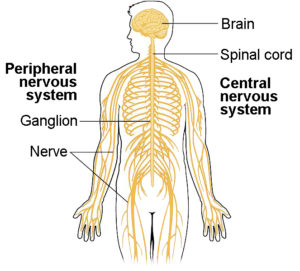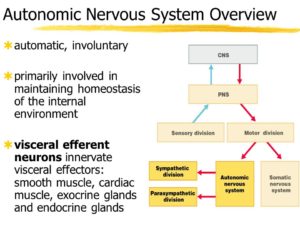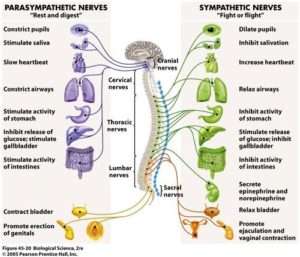


The nervous system is a complex, sophisticated system that regulates and coordinates body activities. It is made up of two major divisions, including the following:
- Central nervous system. This consists of the brain and spinal cord.
- Peripheral nervous system. This consists of all other neural elements, including the peripheral nerves and the autonomic nerves.
 |
|
The Nervous System (Click to Enlarge)
|
In addition to the brain and spinal cord, principal organs of the nervous system include the following:
- Eyes
- Ears
- Sensory organs of taste
- Sensory organs of smell
- Sensory receptors located in the skin, joints, muscles, and other parts of the body
What are some disorders of the nervous system?
The nervous system is vulnerable to various disorders. It can be damaged by the following:
- Trauma
- Infections
- Degeneration
- Structural defects
- Tumors
- Blood flow disruption
- Autoimmune disorders
Disorders of the nervous system
Disorders of the nervous system may involve the following:
- Vascular disorders, such as stroke, transient ischemic attack (TIA), subarachnoid hemorrhage, subdural hemorrhage and hematoma, and extradural hemorrhage
- Infections, such as meningitis, encephalitis, polio, and epidural abscess
- Structural disorders, such as brain or spinal cord injury, Bell’s palsy, cervical spondylosis, carpal tunnel syndrome, brain or spinal cord tumors, peripheral neuropathy, and Guillain-Barré syndrome
- Functional disorders, such as headache, epilepsy, dizziness, and neuralgia
- Degeneration, such as Parkinson disease, multiple sclerosis, amyotrophic lateral sclerosis (ALS), Huntington chorea, and Alzheimer disease
Signs and symptoms of nervous system disorders
The following are the most common general signs and symptoms of a nervous system disorder. However, each individual may experience symptoms differently. Symptoms may include:
- Persistent or sudden onset of a headache
- A headache that changes or is different
- Loss of feeling or tingling
- Weakness or loss of muscle strength
- Sudden loss of sight or double vision
- Memory loss
- Impaired mental ability
- Lack of coordination
- Muscle rigidity
- Tremors and seizures
- Back pain which radiates to the feet, toes, or other parts of the body
- Muscle wasting and slurred speech
The symptoms of a nervous system disorder may resemble other medical conditions or problems. Always consult your healthcare provider for a diagnosis.
Healthcare providers who treat nervous system disorders
Healthcare providers who treat nervous system disorders may have to spend a lot of time working with the patient before making a probable diagnosis of the specific condition. Many times, this involves performing numerous tests to eliminate other conditions, so that the probable diagnosis can be made.
Neurology. The branch of medicine that manages nervous system disorders is called neurology. The medical healthcare providers who treat nervous system disorders are called neurologists.
Neurological surgery. The branch of medicine that provides surgical intervention for nervous system disorders is called neurosurgery, or neurological surgery. Surgeons who operate as a treatment team for nervous system disorders are called neurological surgeons or neurosurgeons.
Rehabilitation for neurological disorders. The branch of medicine that provides rehabilitative care for patients with nervous system disorders is called physical medicine and rehabilitation. Healthcare providers who work with patients in the rehabilitation process are called physiatrists.


